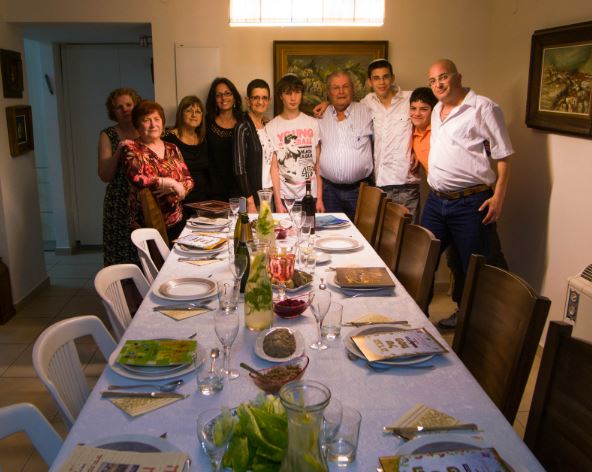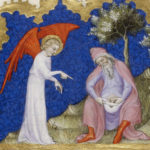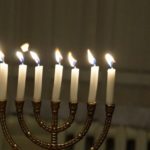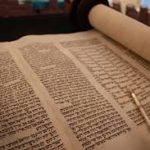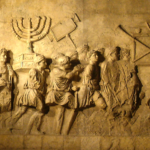Passover
The holiday of Passover is the celebration by Jews of the Exodus out of Egypt, out of slavery and into a life as free men. It is the first of the three major Jewish holidays to be explained to Moses by God, even while the Israelites are still in Egypt, in preparation for the last of the ten plagues. (beginning Exodus 12:1)
The Biblical Injunction
In this first passage (Exodus 12:1) God tells Moses to instruct the people on how to take an unblemished animal and slaughter it and make sure that there is only enough for all to eat. If however there are leftovers, these must be burned, and not taken with them the following day. The blood from this animal is to be collected and then used to mark the doorposts and lintel, to be the sign for the angel of death to pass over these homes and not slay the firstborn.
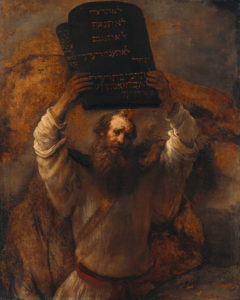
It is from here that the holiday derives its name.
God also instructs Moses that this holiday is to be a day of remembrance and to be celebrated as a festival for all generations to honor God (Exodus 12:14)
Passover is also known as the holiday of unleavened bread (Exodus 12: 15). Unleavened bread means unyeasted bread. This holiday is to be kept for seven days beginning with a thorough cleaning of the home to free it from all leavened foods. God also instructs the Israelites through Moses that both on the first and the last day of the feast they are to hold sacred gatherings.
Implementation of the Injunction
From the very beginnings of Judaism, this holiday has been celebrated within the Biblical injunctions. It should be said that later generations have added to this basic injunction and imbued the holiday with additional meanings, but always keeping the spirit of these commandments, even adding to them.
For observant Jews, the preparations for the holiday begin weeks in advance with a thorough cleaning of the house. Everything is turned inside out to remove all vestiges of leavened food from the house. The last to be cleaned is the kitchen where all daily crockery, utensil, pots, and pans will be exchanged with the same that is only used for the Passover holiday.
As with all Jewish holiday Passover begins in the evening, and what self-respecting tradition will not start with a good meal is known as the Seder (the order) meal. The order – that all things have to be done in the right order.
This meal is the main celebration of the Passover. When all are gathered around the festive table, the reading of the Hagada (The Story) begins. Almost the very first sentence is that it must be read as if it was a personal experience as if the diners were in Egypt as slaves to be set free by the intervention of God, from slavery into freedom.
The holiday is thus a holiday celebrating freedom in all forms.
The Hagada is basically a retelling of the story, or how the Israelites were enslaved by Pharaoh (no specific name is given), how god liberates the Israelites through Moses. Much additional text has been added over the generations to form the modern Hagada.
During the reading and at the appropriate time certain foods are eaten: bitter herbs – a reminder of the bitter years of slavery; charoset (a mix of raisins, dates, apples, nuts) – a reminder of the mix used for building; matzo, the unleavened bread – a reminder that there was no time to yeast dough; a shank bone (today-usually a chicken leg) – a reminder of the Passover sacrifice; half a hard-boiled egg dipped in saltwater – a reminder of the salty tears of slaves.
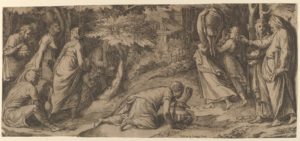 A comparison is also made between this evening and all other evenings through one question with four answers.
A comparison is also made between this evening and all other evenings through one question with four answers.
Question: Why is this night different from all other nights?
Answers – on all other nights we eat leavened and unleavened bread, tonight only unleavened
on all other nights we eat all herbs, tonight only bitter herbs
on all other nights only one dipping, tonight twice
on all other nights we sit, tonight we recline
Many of the texts have been set to music so that they are sung during the reading, usually with great gusto (despite rumbling stomachs). At the point of the reading of the 10 plagues, the finger is dipped into the wineglass and a drop deposited on the plate – a reminder of each of the plagues.
The Hagadah is honoring God and all the good things he has done for the Jews. It is a celebration of what has been, not of things promised. This is expressed most clearly in the text known as “Dayenu” (It would have been enough) – a reiteration of all the things God has done – from the exodus through the safe passage into freedom, the receiving of the Torah (The Law) up till the building of the Temple in Jerusalem. Whoever does not know how to count will learn this evening (at least to 13) during a song
exalting various aspects of god and how he is expressed.
The meal and the evening ended with the words: B’Shana Ha’Baah B’Yerushalayim (Next Year in Jerusalem), expressing the continued yearning to return to the land as promised by God to Abraham. For Jews now living in modern Israel, this has been replaced with B’shana ha’baah b’yerushalayim ha’bnuya (Next Year in the rebuilt Jerusalem).
The Passover is a celebration of God, of his goodness and greatness. It is a recognition and celebration and honoring of the great value of freedom. It is a celebration of the greatest gifts from God: life and freedom

